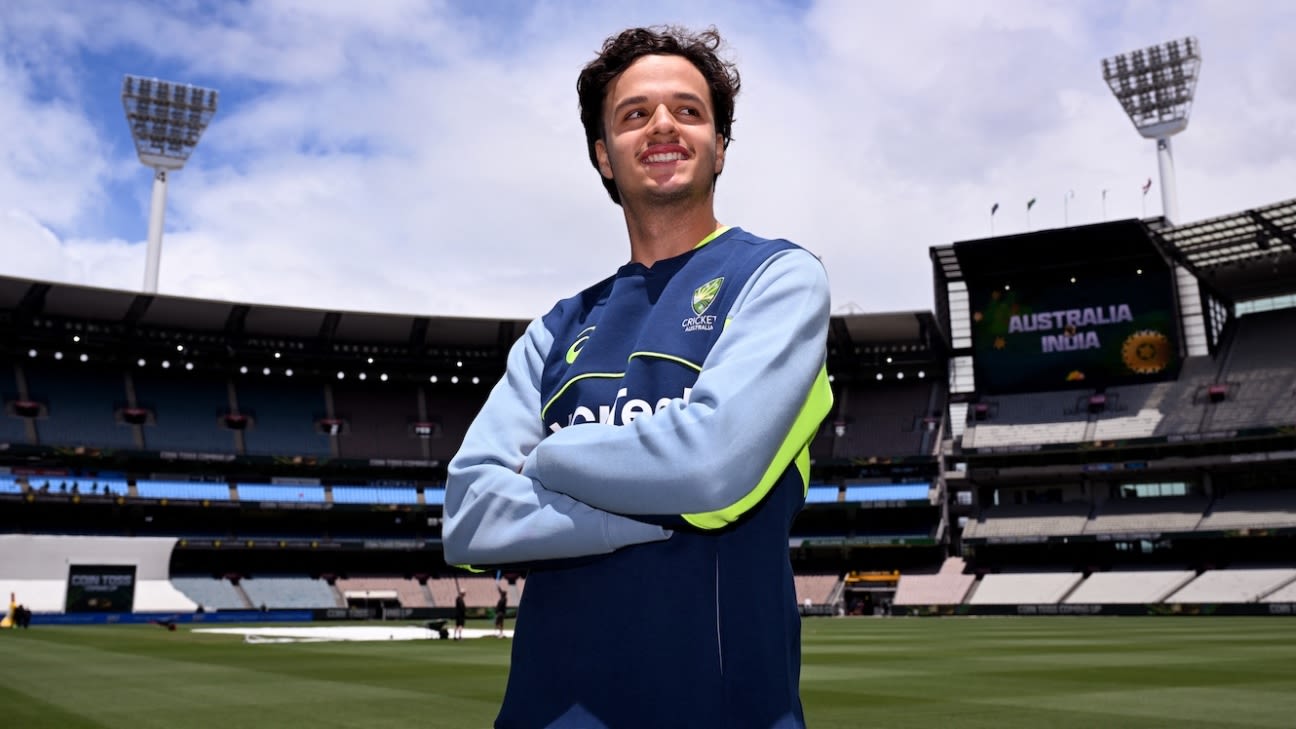 |
|
Sam Konstas, a mere 19 years old, finds himself on the brink of a momentous occasion: a potential Test debut at the Melbourne Cricket Ground (MCG) against India on Boxing Day. His composure and maturity belie his age, leaving seasoned observers awestruck by his calm demeanor in the face of immense pressure. This remarkable young cricketer has captured the attention of the Australian cricketing world, not just for his raw talent, but for his exceptional mental fortitude, a quality honed under the tutelage of former Australian all-rounder Shane Watson. Konstas’s journey to this pivotal moment is one marked by both sudden ascendance and periods of quiet reflection, showcasing the resilience and adaptability required to thrive in the intensely competitive world of professional cricket.
Konstas's rapid rise began with a stunning performance in the Sheffield Shield, where he became the third-youngest player in history to score twin centuries. This remarkable feat catapulted him into the national spotlight, instantly transforming him from a relatively unknown prospect to a player being compared to legendary figures like Ricky Ponting. However, his subsequent performances weren't always consistent, showing glimpses of brilliance alongside moments of youthful vulnerability. Scores of 2 and 43 in a match watched by Australian selectors, followed by a pair of low scores against India A, momentarily dimmed the spotlight. Yet, these setbacks didn’t deter him; instead, he used them as learning experiences, adapting his approach and solidifying his position as a genuine contender for a spot in the Test team.
The narrative of Konstas's potential selection is intricately intertwined with the struggles of another player, Nathan McSweeney. While McSweeney initially held the advantage, consistent difficulties against India's star bowler, Jasprit Bumrah, swung the pendulum in Konstas's favor. McSweeney's struggles highlighted a critical aspect of team selection: the need for diversity in approach and style. Konstas, with his aggressive batting style, offers a contrasting approach to the more technically sound but perhaps less dynamic methods of other established Australian batsmen. His recent performances, particularly his impressive 107 off 97 balls against a full Indian bowling attack (excluding Bumrah), have showcased his ability to score quickly and effectively, an attribute deemed crucial in countering India's bowling prowess.
Central to Konstas’s exceptional mental fortitude is his relationship with Shane Watson. Watson, renowned not only for his cricketing prowess but also his insightful work on mental skills training, has served as a mentor to Konstas since the young player was 16 years old. Watson’s guidance, emphasizing a process-driven mindset over an outcome-focused approach, has played a pivotal role in shaping Konstas's ability to remain calm and composed under immense pressure. This approach, detailed in Watson's book “The Winner’s Mindset,” has helped Konstas develop a level of mental resilience far beyond his years, enabling him to navigate the challenges of high-stakes cricket with remarkable ease. Watson's influence extends beyond mere theoretical instruction; he actively provides support and guidance, even going to the extent of flying to Melbourne with his family to witness Konstas's potential debut, showcasing the strength of their relationship.
The contrast between Konstas's approach to preparation and that of established Australian players further underscores his unique mindset. While seasoned batsmen like Usman Khawaja, Steve Smith, and Marnus Labuschagne engaged in extensive net sessions, Konstas opted for a shorter, more focused practice. He didn't feel the need to over-exert himself or attempt to impress, demonstrating a confidence and self-awareness that belies his age. Instead, he displayed a level of maturity and team spirit, assisting teammates with their practice before leaving the optional session early – a gesture more consistent with a seasoned veteran than a 19-year-old. This incident highlights his exceptional self-awareness and his astute understanding of what is necessary for success. The lack of frantic preparation indicates a confidence in his abilities and an understanding of his own skillset, a confidence that is often missing in younger players.
While there is no guarantee Konstas will actually make his debut on Boxing Day, his calm and composed demeanor at his first Australia training session, coupled with his impressive recent performances and his exceptional mental game, make him a strong candidate. The selectors face a difficult choice, weighing the potential benefits of his aggressive style and youthful enthusiasm against the experience and consistency of other players. Regardless of the final decision, Konstas's remarkable story serves as a testament to the power of talent, diligent preparation, and a strong mental game. His journey, so far, is already an inspiration, and whether or not he makes his debut this Boxing Day, his future in international cricket appears incredibly bright.
Source: Konstas looks 19, behaves 30, and is unfazed about a Test debut at the MCG
